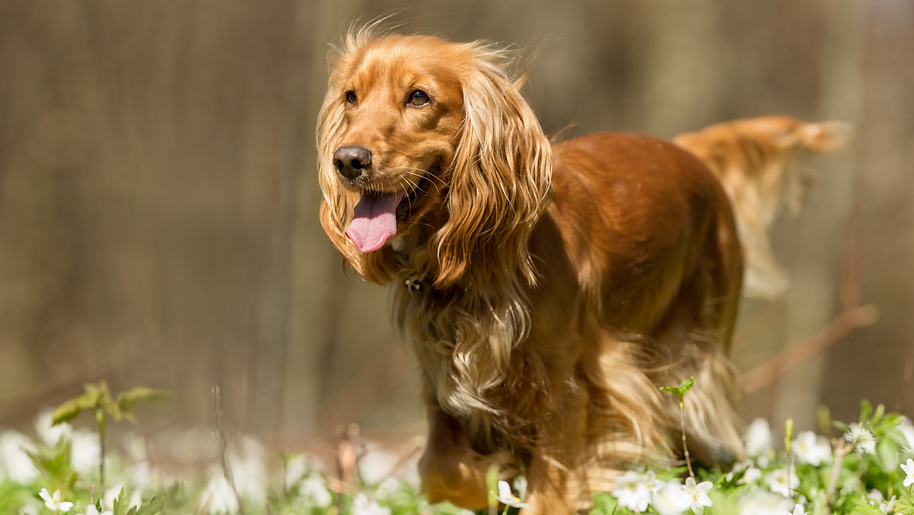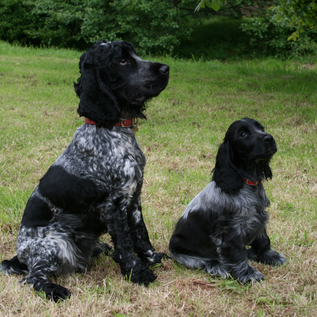Cocker Spaniel

Cocker Spaniels have long captured the hearts of dog enthusiasts around the world with their charming demeanor, luxurious coat, and spirited personality. Originating from England, these dogs have a rich history and a range of characteristics that make them a beloved choice for families and individuals alike.
Breed history
The Cocker Spaniel’s roots can be traced back to 14th-century Spain, where they were initially bred as hunting dogs. The name “Cocker” comes from their aptitude in flushing out woodcocks. Over time, the breed found its way to England and was refined to become the distinctively stylish and energetic Cocker Spaniel we know today. In 1892, the American Kennel Club officially recognized the breed, differentiating it from its larger cousin, the Springer Spaniel.
Life expectancy
On average, Cocker Spaniels have a life expectancy of 12 to 15 years
Size
Cocker Spaniels are a medium-sized breed. Fully grown cockers typically stand between 14.5 to 15.5 inches (35-40cm) Their weight ranges from 24 to 33 pounds (10-15kg).
Exercise & training
Cocker Spaniels are energetic and intelligent dogs that require regular exercise to keep both their bodies and minds engaged. Expect to deliver daily walks of 45 mins – 1 hour. Shorter walks would be acceptable if combined with play sessions or interactive games. These activities are essential to prevent boredom and maintain their overall well-being. Due to their hunting heritage, Cocker Spaniels have a strong instinct to explore and sniff, making them naturals at various dog sports like agility and scent work. Consistent training is vital to harness their intelligence and prevent behavioral issues.


Grooming/Shedding
One of the most iconic features of Cocker Spaniels is their luxurious, medium-length coat. Regular grooming is a necessity to keep their fur tangle-free and healthy. Brushing several times a week helps minimize matting and shedding. Additionally, their ears, being prone to infections, should be cleaned and checked regularly. Professional grooming every few months helps maintain their coat’s beauty and overall cleanliness.
Common traits
Cocker Spaniels are known for their friendly and affectionate nature. They thrive on human companionship and often form strong bonds with their families. Their expressive eyes and wagging tails make them a delight to be around. They are generally good with children and other pets if properly socialized from an early age.
Common health problems
While Cocker Spaniels are generally healthy dogs, there are a few health issues that are more prevalent within the breed. These include:
-
Ear Infections
-
Their long, floppy ears can trap moisture and debris, leading to ear infections.
-
-
Eye Conditions
-
Cocker Spaniels are prone to various eye issues, including cataracts and glaucoma.
-
-
Skin Conditions
-
Their skin can be sensitive and prone to allergies and infections.
-
-
Immune mediated conditions
-
Immune mediated haemolytic anaemia (IMHA) and Immune mediated thrombocytopenia (IMTP) are common conditions in the breed. They are both autoimmune disorders where the dog’s immune system mistakenly attacks its own red blood cells or platelets, leading to their destruction. This condition can result in a range of symptoms, including lethargy, weakness, pale gums, jaundice, bruising of the gums and skin and even collapse. Cocker Spaniels, like other breeds, can be predisposed to IMHA and IMTP due to genetic factors. However, the exact cause is not always clear. It can be triggered by infections, medications, vaccinations, or other underlying diseases. Early diagnosis is crucial, as the condition can progress rapidly and become life-threatening.
-
Variations
Cocker Spaniels are divided into two main types: American Cocker Spaniels and English Cocker Spaniels. Within the English Cocker spaniel type there is a further subdivision into show or working Cocker spaniel. American Cockers are generally smaller and have a more profuse coat. English Cockers are slightly larger and have a more athletic build. Both types share the same friendly temperament and playful nature. The english working cocker spaniel is the most active and demands the most input in training, mental stimulation and exercise.

Pros
-
Loving Companions: Cocker Spaniels are affectionate and thrive on forming strong bonds with their human families.
-
Adaptability: They can adapt well to both apartment living and larger homes, as long as they receive sufficient exercise.
-
Intelligence: Their intelligence makes them responsive to training and enjoyable to engage with in various activities.
Cons
-
Grooming Demands: Their beautiful coat requires regular grooming, which can be time-consuming and may require professional assistance.
-
Health Concerns: Cocker Spaniels are predisposed to certain health issues that need careful monitoring and management.
-
Separation Anxiety: Due to their social nature, they can develop separation anxiety if left alone for extended periods
In conclusion, Cocker Spaniels make wonderful companions for families and individuals who can provide them with the attention, exercise, and grooming they need. With their rich history, charming personality, and luxurious coat, they have rightly earned their place as one of the most beloved dog breeds in the world. Remember that responsible ownership, regular exercise, proper grooming, and routine veterinary care are essential to ensure a happy and healthy life for your Cocker Spaniel.
.png)






